Matt Kennard reports on an example of “authoritarian neoliberalism,” the imposition of widespread privatization by U.K.-backed dictators.
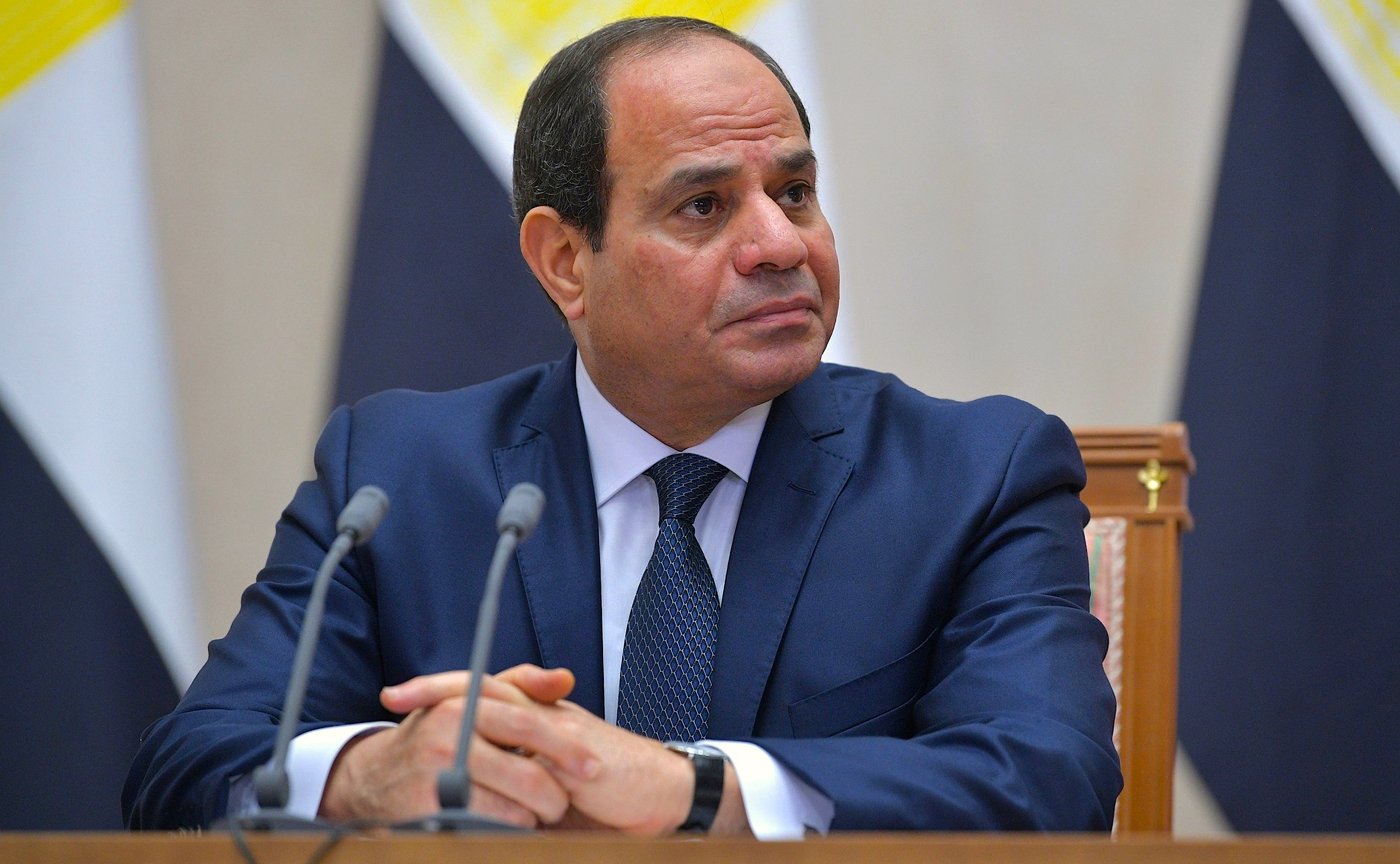
Egyptian President Abdel Fattah El-Sisi. (Kremlin)
By Matt Kennard
Declassified U.K.
 Egyptian dictator Abdul Fattah al-Sisi assumed power in 2014 after a military coup had overthrown Egypt’s first democratically-elected leader the previous year.
Egyptian dictator Abdul Fattah al-Sisi assumed power in 2014 after a military coup had overthrown Egypt’s first democratically-elected leader the previous year.
Since then, he has presided over a human rights crackdown in the North African country, locking up thousands of political prisoners. Arbitary arrest and torture are widespread.
Sisi’s Egypt, which is set to host the COP27 climate conference next month, is in the midst of a “human rights crisis”, according to Amnesty.
Among the regime’s detainees is British pro-democracy activist, Alaa Abdel Fattah, who has been on hunger strike since April. His family is worried he could soon die.
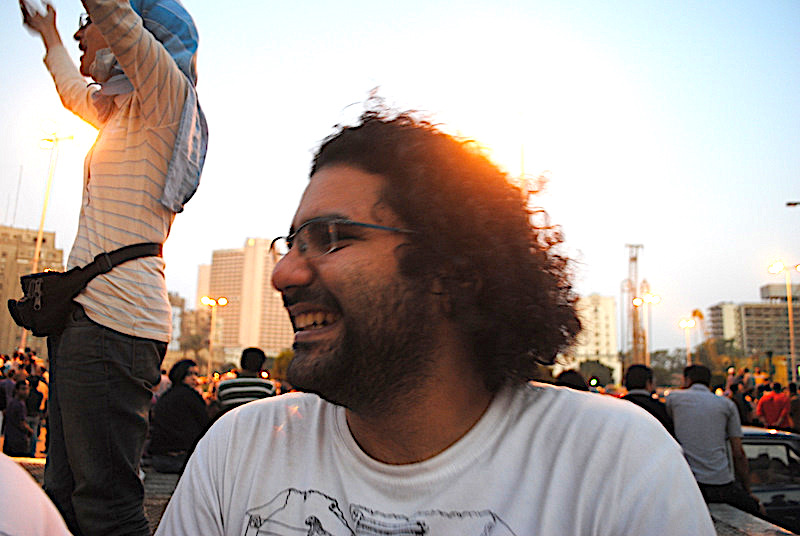
Alaa Abdel Fatah in Cairo’s Tahrir Square, 2011. (Lilian Wagdy, CC BY 2.0, Wikimedia Commons)
Britain has grown increasingly close to Egypt’s regime as repression has increased. The head of MI6, Richard Moore, met with Sisi in Cairo in late 2020 to discuss “intelligence cooperation.”
Senior officials from MI5 and MI6 train Egyptian spies every year at a U.K. military base just north of London.
But U.K. aid is another strand of British involvement in the country. The U.K. aid programme in Egypt lists its top priority as helping “public bodies begin to become independent entities’ and open protected sectors to foreign/private investment.”
It costs around £14 million a year — 98 percent of which comes Britain’s aid budget.
The aim of the economic segment of the aid programme, which costs around £4m a year, is to “implement structural reforms” in Egypt’s economy.
The programme is being planned in close coordination with the Egyptian regime — and is aimed at helping Sisi with his “reform priorities.”
It is run through the Conflict, Security and Stability Fund (CSSF), a cross-government pot of money with the stated aim of preventing “instability and conflicts that threaten U.K. interests.”
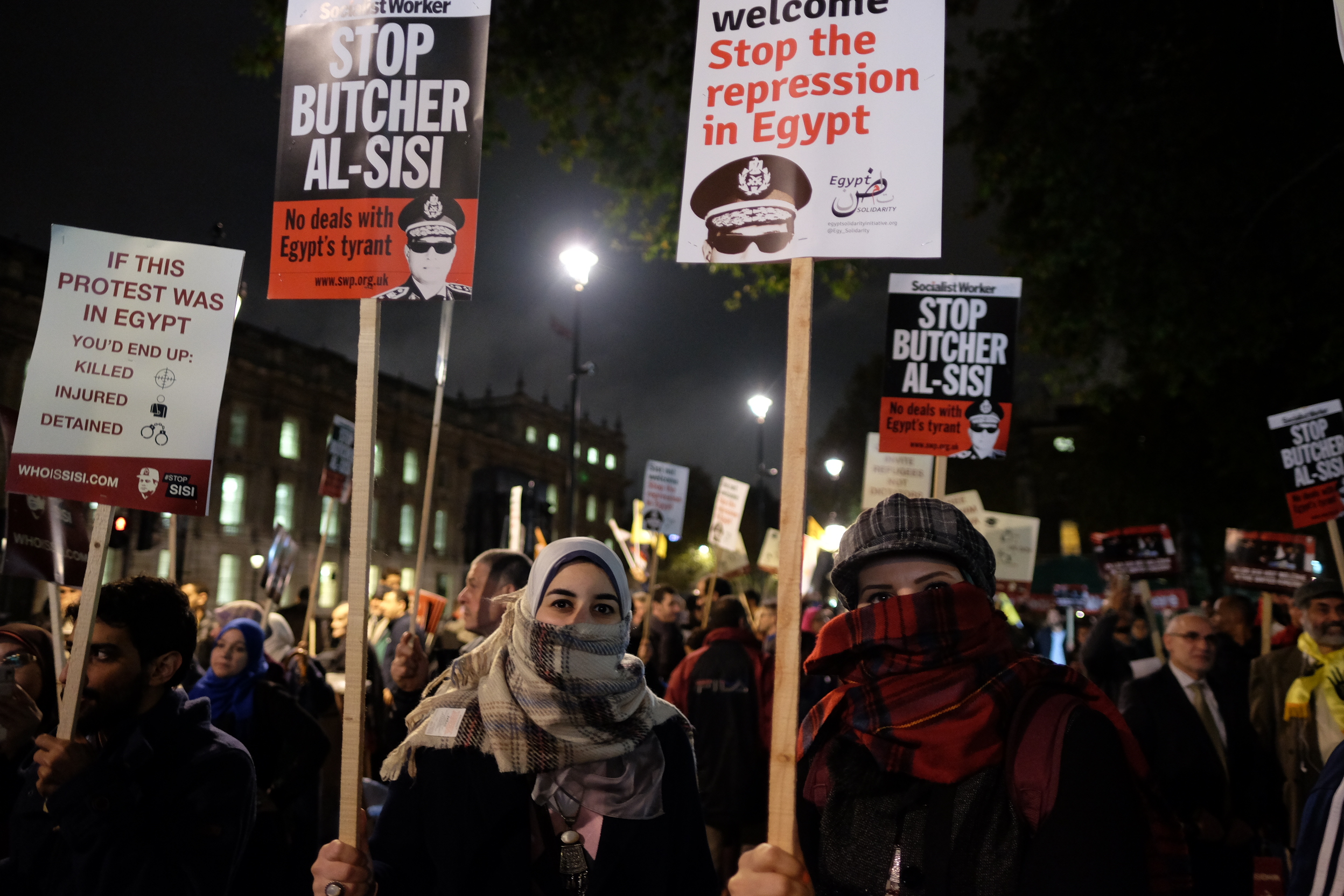
Protesting outside 10 Downing Street against U.K. visit of Egypt’s President Sisi, November 2015. (Alisdare Hickson, Flickr, CC BY-SA 2.0, Wikimedia Commons)
The National Security Council, which is chaired by the prime minister, sets the fund’s strategic direction. But a parliamentary committee found the CSSF was “being used as a ‘slush fund’ for projects” which “do not meet the needs of U.K. national security.”
Privatisation Drive
Egypt has many coveted assets which have long been under the control of the state or the military. But the Sisi regime has been pushing privatisation.
In 2018, as the CSSF aid programme began, Egypt named 23 state companies slated for privatisation. Then in January this year, Egypt’s planning minister said the country aimed to sell stakes in state-owned companies every month.
In May, Egyptian Prime Minister Mostafa Madbouli announced another string of planned privatisations of state-owned companies. Madbouli laid out plans for 10 state-owned companies and two army-owned companies to be listed on the stock market this year.
The U.K. aid encouraging privatisation is being channelled through two World Bank projects in Egypt. The most expensive is a “strategic partnership” with the World Bank.
The other funds the International Finance Corporation (IFC), the private-sector lending arm of the bank, which pushes privatisation of public services and subsidises oligarchs around the world.
The World Bank’s country partnership framework, which U.K. aid is supporting, aims at “improving the business climate for private investments.” It also encourages “investment climate reforms that would boost investor confidence and facilitate greater private sector participation.”
The World Bank, the framework notes, “will seek to encourage … cross-border private investments in energy and water.”
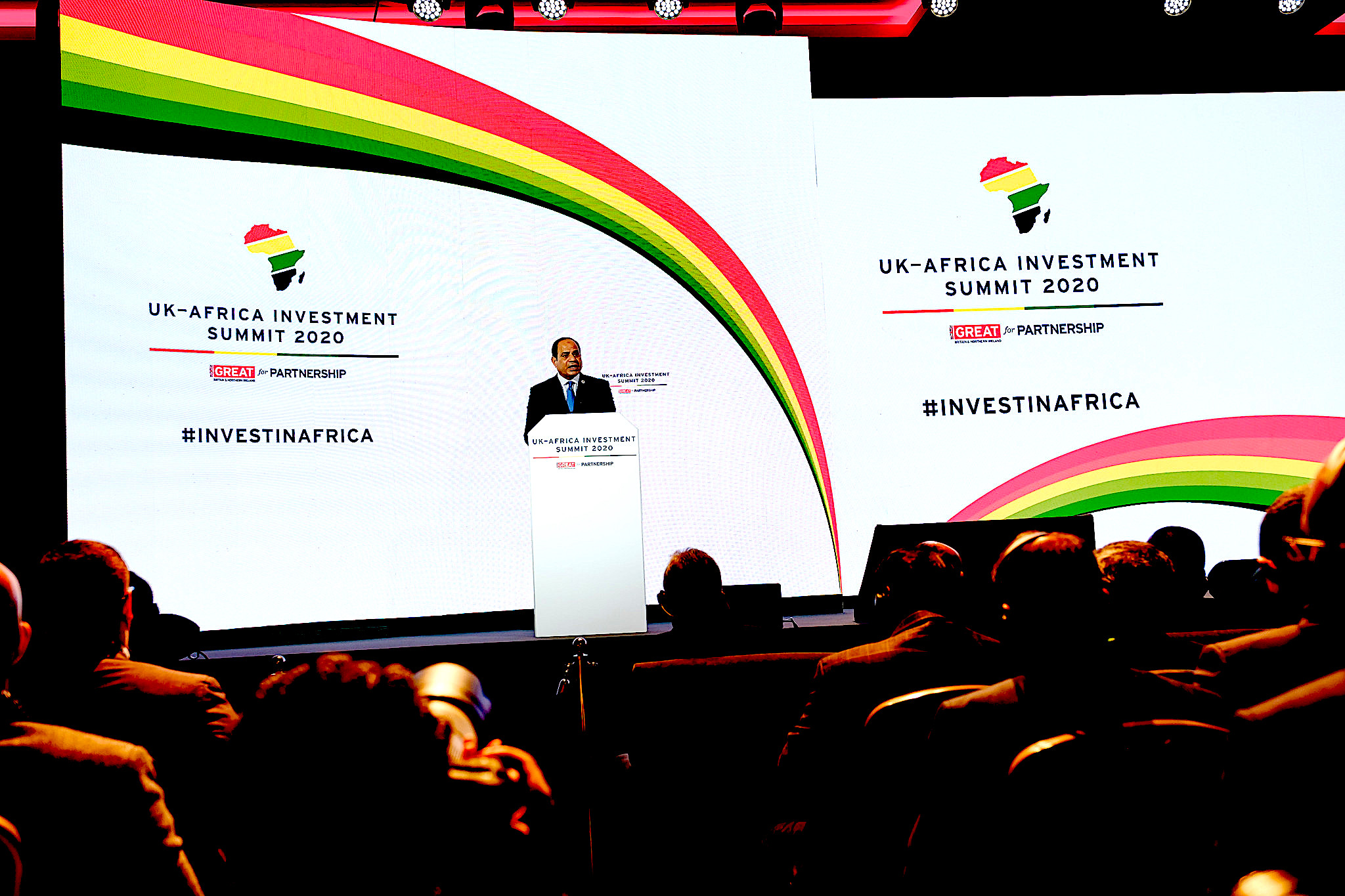
Egypt’s President Abdel Fattah Al-Sisi speaking at the U.K.-Africa Investment meeting in London, Jan. 20, 2020. (U.K. Department for International Development, Flickr, CC BY 2.0)
The Egypt programme appears to be another example of how the British aid budget is politicised to pursue state and corporate objectives under the cloak of altruism. It also appears to be an example of what has been dubbed “authoritarian neoliberalism,” the imposition of widespread privatisation by U.K.-backed dictators.
Britain backs most of the world’s authoritarian regimes and often uses its diplomatic power and aid budget to push allies to privatise state-owned assets and allow U.K. business to invest.
UK Interests
The U.K. is one of the largest investors in Egypt, with the total estimated at £50 billion and with 2,000 U.K. companies operating in the Egyptian market.
The U.K. government has made a concerted push for companies to engage in Egypt since Sisi took power, establishing a British Investors Forum to encourage investment in 2019.
Repression at the time was picking up. That year, Human Rights Watch noted that Sisi’s
“security forces have escalated a campaign of intimidation, violence, and arrests against political opponents, civil society activists, and many others who have simply voiced mild criticism of the government.”
The prize investment for the U.K. government in Egypt is that of BP, which has operated in the country for almost 60 years. “We have become a major pillar of the country’s energy industry,” the company notes.
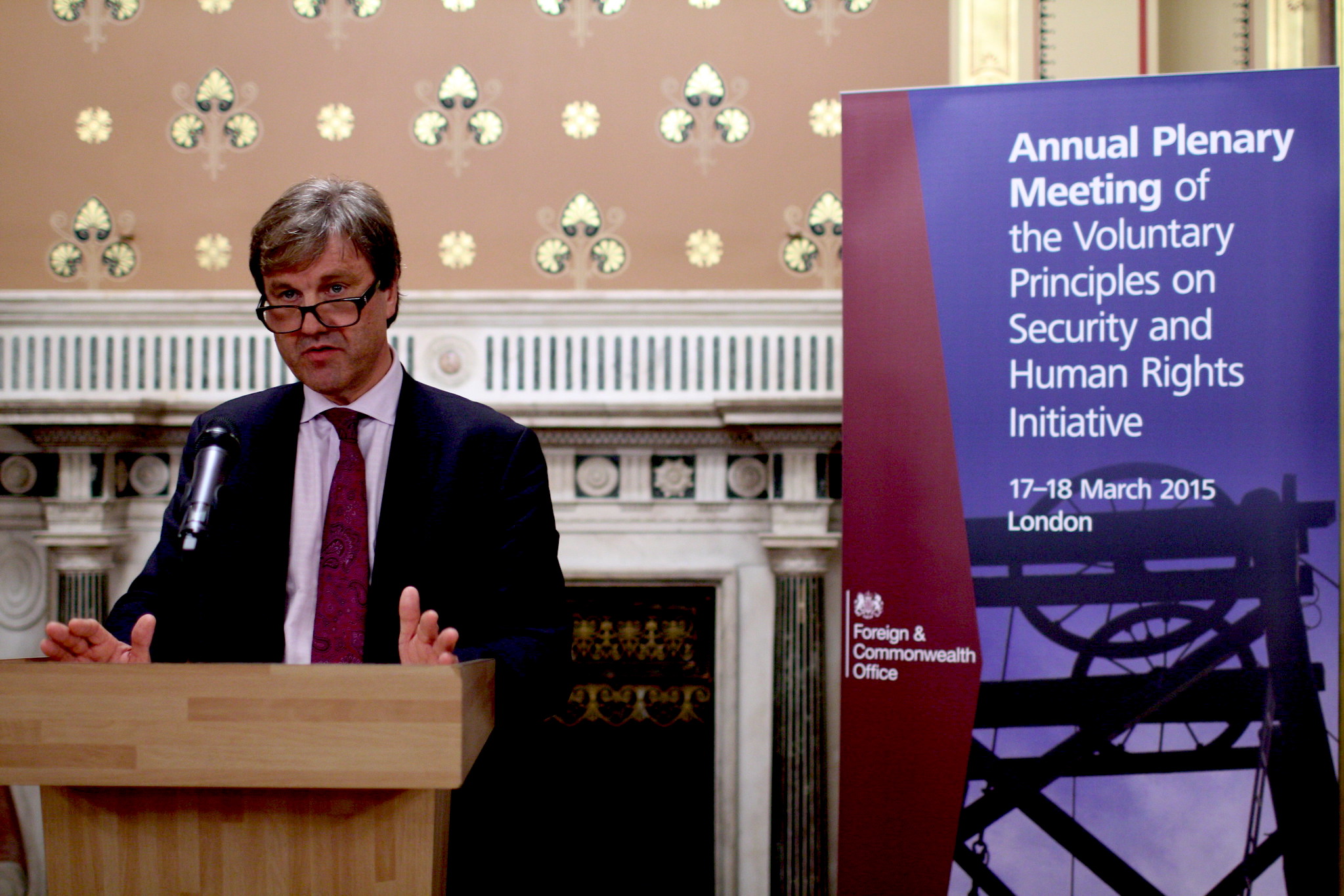
A BP executive, Peter Mather, addressing a human rights meeting at the Foreign Office in London in 2015. (FCO, Flickr, London, CC BY 2.0)
Over that time, the British oil giant, which is close to the Foreign Office and MI6, has produced almost 40 percent of Egypt’s oil. The company currently produces 50 percent of the country’s gas.
The former head of MI6, Sir John Sawers, joined the board of BP in 2015, the year after he left the intelligence agency. He was paid £699,000 by the company over the next four years.
In 2015, the year after Sisi took power, BP announced a new $9 billion investment in the West Nile Delta gas development, which includes five gas fields.
The company said its investment was “a vote of confidence in Egypt’s investment climate and economic potential.”
BP currently holds an 83 percent stake in the development, which accounts for 25 percent of Egypt’s gas production.
At the time of the investment, Sisi was tightening his grip on power through brutal means. “Egypt’s human rights crisis, the most serious in the country’s modern history, continued unabated throughout 2014,” Human Rights Watch noted.
The Foreign Office told Declassified it regularly raises human rights issues with Egypt, but would not provide an on-the-record comment.
Matt Kennard is chief investigator at Declassified U.K.. he was a fellow and then director at the Centre for Investigative Journalism in london. Gollow him on twitter @kennardmatt
This article is from Declassified UK.
The views expressed are solely those of the author and may or may not reflect those of Consortium News.

Unfortunately, everything does not exist in isolation. The problem is that the West is running out of Soviet era Cold War weapons systems like tanks and artillery to send to Ukraine. Both Egypt and Cyprus apparently have these models, so it isn’t surprising to see something like this or the lifting of the Cyprus arms embargo, last week, etc. Whether it is the UK or the US, the motive remains the same. Israel apparently also has some of these arms and were slapped down by Russia, saying arms transfers to Ukraine will seriously damage the Israeli-Russian relationship. What will Egypt do?
In a nutshell…US/UK birds of the same feather…
Exactly! And what I’m asserting in a letter to the editor, for whatever good it might do for the somnambulist, of which there seem many in the US.
So sad. The UK pretends it cares for “human rights” and it brands Chinese and Russian leaders, who actually help their people advance, as “dictators” as if it did not support real dictators like Sisi. Privatisations are a big step away from the vaunted “democracy” the UK claims for entities like Ukraine, but they mean less control by the people and more by global corporations. The new Brutish (sic!!!) PM is unlikely to reduce this tendency.
Chinese leader Mao is supposed to have said: the East wind will prevail over the West wind…Absolutely! And the sooner, the better.
Again, same is true for the US! UK and US are partners in this crime of centuries long imperialism, colonialism against all citizens of the world, even in the USA. They just don’t know it yet. ciò di cui il mondo ha bisogno ora è la verità
UK and US are partners in this crime of centuries long imperialism, colonialism against all citizens of the world, even in the USA. They just don’t know it yet. ciò di cui il mondo ha bisogno ora è la verità
Might this not read, “UK buys more shares in Egypt’s Neoliberalism”? And how many shares of England has BP?
This has to be a response to the lack of fuel in Britain, and of course a bribe to Egypt’s officials and corporations to assure that Egyptians bear part of Europe’s suffering for the West’s destruction of Nordstream.
One of Leonard Cohen’s last songs goes like this:
You Want It Darker
If you are the dealer, I’m out of the game
If you are the healer, it means im broken and lame
If thine is the glory, then mine must be the shame
You want it darker
We kill the flame
Magnified, sanctified
Be the holy name
Vilified, crucified
In the human frame
A million candles burning
For the help that never came
You want it darker
Hineni, hineni
I’m ready, my Lord
There’s a lover in the story
But the story’s still the same
There’s a lullaby for suffering
And a paradox to blame
But it’s written in the scriptures
And it’s not some idol claim
You want it darker
We kill the flame
They’re lining up to prisoners
And the guards are taking aim
I struggle with some demons
They were middle class and tame
I didn’t know I had permission
To murder and to maim
You want it darker
Hineni, hineni
I’m ready, my Lord
Magnified, sanctified
Be the holy name
Vilified, crucified
In the human frame
A million candles burning
For the love that never came
You want it darker
We kill the flame
If you are the dealer, let me out of the game
If you are the healer, I’m broken and lame
If thine is the glory, mine must be the shame
You want it darker
Hineni, hineni
Hineni, hineni
I’m ready, my Lord